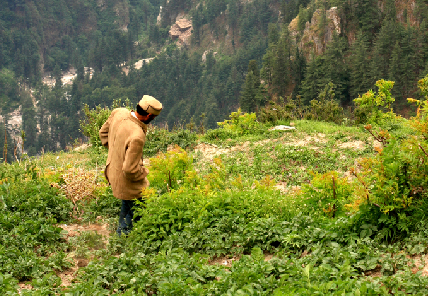Shimla: As politics of marijuana advocacy sobers up America, residents of Kullu valley meekly look for a way out from the draconian Narcotic Drugs and Psychotropic Substances (NDPS) law to cultivate and trade charas, something that always was a way of life till Parliament criminalized it in 1985.
“With Colorado and Washington, two states of America, voting in favour of legalizing recreational use of marijuana (Charas) on November 7, its time the Indian authorities realized the futility criminalizing the socio-cultural and functional uses of cannabis growing in Kullu valley,” Vikas Thakur (name changed), a resident of Kullu valley that is famous for producing the world’s best charas.
The courts in Kullu valley and other places in Himachal Pradesh, including the High Court, testify to the flourishing illegal trade as they have many cases pending related to Indians and foreigners booked under NDPS Act either for trading in the contraband or for possessing small quantities of charas for recreational uses.

“Malana cream is the best charas the world produces,” says Thakur, “but the entire operation of producing it is carried out in an illegal manner in an otherwise underdeveloped and impoverished valley of Kullu.”
Growing marijuana was permitted under British colonial rule but it turned suspect after hippie culture invaded the valley in the 1960s and its cultivation was made illegal under Section 20 of NDPS in 1985 which concerns ‘Punishment for contravention in relation to cannabis plant and cannabis’, with those found in violation attracting a jail term of 10 years.
Despite a cultivation ban, police officials involved in containing the contraband trade on the side admit that Himachal is the largest producer of charas in the country, contributing as much as 25 percent of the total production.
Daniela Berti, a French social anthropologist and a Center for Himalayan Studies researcher in her 2011 study ‘Trials, Witnesses, and Local Stakes in a District Court of Himachal Pradesh’ concludes that commitments made by India, nationally and internationally, “in the field of narcotics control have led to an increase in the criminalization of a formerly widespread practice culturally approved by some villagers.
“Indeed, cannabis cultivation is now under the control of national and international dealers, who even encourage villagers to plant cannabis in fields previously reserved for ordinary crops,” observes the researcher in the paper.
“Domestic and traditional use of cannabis may persist, but when a villager cultivates cannabis today it is also, first and foremost, to respond to a market demand,” mentions Berti.
“Surely all do not visit Manali for its scenic beauty,” says Thakur, “some come for the grass (dope). So be it, for it depends what kind of a holiday one is looking for.”
Earlier a study ‘Drug Trade in Himachal Pradesh’ financed by UNESCO Management of Social Transformation Program and done Molly Charles in 2001 pointed out cannabis products were used by villagers to perform religious ceremonies (like Shivaratri), to prepare medicine, produce local shoes, bags, ropes and even to make a certain number of dishes.
This study of the drug trade argues that it is impossible to enforce legislation that does not take into account existing socio-economic and cultural realities.
While consuming Bhang (Charas) is not only socially acceptable during festivals like Holi and Shivaratri, allowed for mystics and sadhus and is even promoted in films,” says Thakur, “ironically its cultivation is banned.”
Legalizing the cultivation of marijuana, will not only unburden the legal system, reduce crowding in jails and will also stop stigmatizing and criminalizing charas consumers, something that is much safer than alcohol and tobacco, contests Thakur.
Please note: Identity of Vikas Thakur has been hidden as he fears the police agencies would question him about the comments made in the article.
Photos Courtesy: Cannabis Culture
As Editor, Ravinder Makhaik leads the team of media professionals at Hill Post.
In a career spanning over two decades through all formats of journalism in Electronic, Print and Online Media, he brings with him enough experience to steer this platform. He lives in Shimla.





Not just Himachal….cannabis (in all forms) should be legalized throughout India. We have been using the plant since ancient times. Govt and big corporations have no problem selling death in the form of tobacco and alcohol but refuse to allow cannabis, a plant that has NEVER killed anyone EVER. Is it because marijuana can be grown anywhere and that if marijuana prices went up, people can grow their own and govt and corporations cant profit from it?
Legalizing the cannabis trade/use is the need of hour for our tiny Himalayan state. It would help control drug trafficking, illegal trade and some control on use of drug within youths. I wonder when “Jhol (local beer)” can have vends why not marijuana which in fact has vends in some of the Indian states under “ganja”.
Legalization would also free up valuable police time.